Specialty Crop Audit Services



In 2022, the Missouri Department of Agriculture entered into a Specialty Crop Cooperative Agreement with USDA to provide specialty crop audit services to Missouri producers. These services include GAP (Good Agricultural Practices) audits, which are coordinated through the Jefferson City office of the Grain Inspection Services program.
This voluntary program is offered to the fruit and vegetable industry to assess an auditee's efforts to minimize the risk of contamination of fresh fruits, vegetables, and nuts by microbial pathogens. The program does not guarantee the product is free from microbial contamination, but confirms the auditee has taken proactive measures to minimize the risk of contamination by adhering to industry-recognized best practices. The responsibility for product safety and the continued observance of best practices rests with the auditee.
GAP audits do not replace Produce Safety (FSMA) inspections. For more information on those inspections, please contact our Produce Safety Program.
Frequently Asked Questions
What is a GAP audit? Is it required?
Good Agriculture Practices (GAP) audits are used to evaluate production, packaging, handling, and storage methods of fruits and vegetables in order to reduce the risk of microbial and physical food safety hazards. Though they may be required by a buyer, they are not required by the Missouri Department of Agriculture from a regulatory perspective, and can be thought of as a market access tool.
GAP audits follow the guidelines set forth in the U.S. Food and Drug Administration's Guide to Minimize Microbial Food Safety Hazards for Fresh Fruits and Vegetables (pdf), along with industry-recognized best management practices. For further information on the GAP auditing system, reference the USDA GAP website.
What is a Harmonized or Harmonized Plus GAP audit?
Harmonized audits incorporate many of the same guidelines as a standard GAP audit, but require a more in-depth analysis of your operation’s practices. This requires a longer auditing period and more preparation leading up to your audit. Harmonized GAP/GAP Plus+ audits follow industry benchmarking standards, such as the Global Food Safety Initiative (GFSI). For more information regarding Harmonized or Harmonized Plus+ audits, visit the USDA website.
As of 2023, our program does not have an auditor licensed for Harmonized GAP or Harmonized GAP Plus+ audits due to the infrequency of requests in Missouri. If you would like one of these audits, please contact USDA at the information below:
Audit Services Branch
(202) 720-5021
SCAudits@usda.gov
How is GAP different from the Produce Safety Rule?
While Good Agricultural Practices (GAP) certification and the Produce Safety Rule (PSR) have many similarities, the systems are not the same and are managed by different federal agencies. GAP is managed by USDA and the PSR is implemented by FDA. For reference, MU Extension has a GAP/PSR comparison sheet found here.
GAP certification, while it may be required by a buyer, is a voluntary audit and can be thought of as a market access tool. The PSR is part of the Food Safety Modernization Act (FSMA), which is a federal law applying to all farms that meet the PSR coverage requirements. The PSR a regulatory inspection for applicable businesses. Please contact the MDA Produce Safety Program team for more information on the Food Safety Modernization Act (FSMA) and the Produce Safety Rule (PSR).
What does a GAP audit inspection look like?
- The auditor will request access to documents (food safety plan, quality manual, standard operating procedures, forms, previous audit reports, maps, and facility layouts) for review before coming for an on-site evaluation. Providing documents ahead of time is not required, but can shorten the time spent on site.
- The on-site portion of the audit will begin with an opening meeting to verify scope and feasibility of the audit, and to discuss the day’s audit plan.
- On-site audits will include the auditor collecting information, observing field and/or packinghouse activities, interviewing employees, and reviewing policies, records and other documents.
- The auditor will discuss any significant findings with the auditee on site.
- Following the site visit, auditors will review their findings and develop an audit report.
- The audit report is sent to the USDA for review and final approval.
- Once approved, most GAP-certified auditees are subject to 1-2 unannounced reviews later in the growing season.
What if I fail? What is a follow-up audit?
If an operation fails an audit, the auditee can complete Corrective Action Reports and a follow-up audit to verify those corrections. Upon successful completion of those steps, the audit can be considered passing. Auditees may also elect not to complete these rectification steps, however a certificate will not be issued.
The extent of the follow-up audit is dependent upon which area(s) of the initial audit failed, and the severity of those non-conformities. Follow-up audits are typically similar in cost to initial audits (for more cost info click here). A desk audit may be performed under special circumstances instead of an on-site follow up.
What is an unannounced review?
An unannounced review is a brief visit to your operation to verify compliance through observation and review of records. These visits are not truly unannounced, but will be scheduled on short notice.
Unannounced reviews are a requirement of your GAP certification, and permission is given through the completion of the SC-651 at the time of your initial audit request. The quantity of unannounced reviews is dependent upon the length of the auditee’s growing season, or if there is reason to suspect non-compliance. If a follow-up audit were required for any reason, it does not take the place of an unannounced review.
Unannounced reviews are charged at the same rate mentioned here. The overall cost for unannounced reviews is typically lower than that of an initial audit as the time spent on site is decreased, and USDA does not typically charge for their services on these reviews.
How do I request a GAP audit?
- If you are a new applicant, you must first establish a billing account with USDA/AMS by completing the SC-430 Vendor Form and submit it to USDA according to the form’s completion instructions.
- Complete and submit the Request for Audit Service Form SC-237A and the Agreement for Participation in Audit Services Form SC-651 to the MDA-GIS office at:
MOGIS@mda.mo.gov
Or
Grain Inspection Services – Specialty Crops
P.O. Box 630
Jefferson City, Missouri 65102
- The MDA office will contact you and confirm the receipt of your request, give you more information about the program procedures, and schedule your audit. If you do not receive confirmation of your request within 10 business days, please submit again or call us at (573) 751-5515 to ensure receipt.
- Please ensure the business name and addresses are correct and consistent across all forms in order to receive a GAP certificate with the correct information.
What do I need before I request a GAP audit? How should I prepare for an audit?
- Determine what type of audit and scopes you need. If your request is buyer-driven, confirm with them what type of audit they desire.
- Ensure you have developed written standard operating procedures (SOPs) and implemented a Food Safety Plan. You should have records/logs that support your practices. You will automatically fail your GAP audit if you do not have a Food Safety Plan.
- Ensure you have completed the appropriate number of microbial tests (or have municipal reports) on the water used in your operation. Check with your local University of Missouri Extension office for resources regarding free microbial water testing for produce growers, or visit the MDA Produce Safety Program page.
- Review available resources and consult with University of Missouri Extension prior to the audit and additionally, as needed.
How much will it cost? How is an audit billed?
Audit pricing can vary widely. The current rate (set by USDA, as of Oct 2025) is $171 per hour. This rate will be charged for all time associated with an audit including preparatory work and coordination, time spent on site for the audit, paperwork and audit completion, processing of corrective actions if applicable, and round-trip travel time. You will also be charged for USDA’s review of the audit and their administrative services.
Initial GAP audits at the $171 per hour rate are estimated around $1300 to $1600 plus travel time, typically to/from the MDA office in Jefferson City. This estimate includes the total costs incurred from MDA and USDA services, but each agency bills separately. Grants and other funding opportunities are available to Missouri producers that may significantly reduce your overall cost (for more cost info click here).
Once initial GAP audits are completed, there may also be follow-up audits or unannounced reviews – each resulting in additional charges at the same hourly rate. The need for a follow-up audit and the quantity of unannounced reviews depend on your operation’s length of harvest, the results of the initial audit, and other factors. Please contact us for additional details.
What funding opportunities are available to help offset the cost of auditing?
One funding opportunity available to Missouri producers is the Food Safety Certification for Specialty Crops (FSCSC) Program through the Farm Service Agency (FSA). Please contact your local FSA office and review the FSCSC website for details.
Please note, the cost share grant previously provided through University of Missouri Extension has been fully dispersed as of December 2024 and is no longer available to GAP auditees.
What if I have more questions?
Grain Inspection Services – Specialty Crops
Phone: (573) 751-5515
Email: MOGIS@mda.mo.gov
